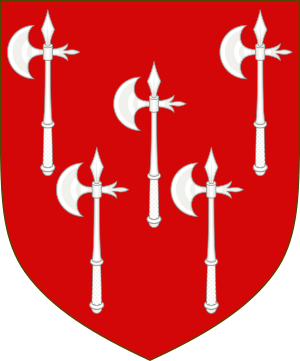Roger Machado (officer of arms) facts for kids
Roger Machado (in Portuguese: Rogério Machado; died 6 May 1510) was an English diplomat and an important official called an officer of arms. He had Portuguese family roots. In 1455, he lived among Portuguese traders in a city called Bruges.
Contents
What is an Officer of Arms?
An officer of arms is like a special expert on things like coats of arms, family histories, and ceremonies. They help organize important events and keep records of noble families.
Machado's Early Career as a Herald
Roger Machado first started his work as a herald, which is a type of officer of arms, around 1478. He was known as the Leicester Herald. In this role, he went on trips to the Low Countries (which are areas like modern-day Belgium and the Netherlands) in 1478 and 1480.
He also took part in the funeral of Edward IV, the King of England, in April 1483. Even though he seemed to be living well, he had some money problems. Because he couldn't pay his debts, he had to leave England in 1484. During this time, he was importing wine from Spain.
Working for Henry Tudor
From January 1485, Machado began working on different missions for the Marquess of Dorset. These trips were probably to help Henry Tudor, who was living away from England at the time.
Just before a big battle called the Battle of Bosworth Field, Henry Tudor made Machado his personal officer of arms. He was given the title Richmond Herald. Machado came back to England with Henry Tudor. On September 21, he was given a job checking customs at Southampton. By the end of October, he was promoted to Richmond King of Arms.
On Christmas Day, he was promoted again to Norroy King of Arms. Later, on January 24, 1494, Machado became the Clarenceux King of Arms, which was a very important position.
Machado's Later Heraldic Work
In June 1498, Machado and another important herald, John Writhe, who was the Garter King of Arms, were given permission to do something called "visitations." A heraldic visitation was when heralds traveled around the country to check on coats of arms and make sure people were using them correctly. However, it seems Machado did not do many of these trips.
Machado was more interested in his trading business and his work as a diplomat. In 1505, the king offered him the top job, Garter King of Arms, but Machado said no. He felt he was too old and not strong enough. He also gave many of his duties as Clarenceux to Thomas Writhe, who became the new Garter. In January 1509, they made a formal agreement where Machado gave up a lot of his power as Clarenceux in exchange for money each year.
Machado's Diplomatic Missions
Even though he had a long career as a herald, Roger Machado is best known for being a very skilled diplomat. A diplomat is someone who represents their country and talks with leaders from other countries.
Machado went on many important and secret missions. He wrote about three of these trips in his journal. The first was to Spain and Portugal in 1488 and 1489. The other two were both to Brittany in 1490, where he played a big part in the discussions.
In August 1494, he was sent to the court of Charles VIII of France, the King of France. They talked about whether France would help Henry VII if another ruler, Emperor Maximilian, supported someone named Perkin Warbeck. Warbeck was pretending to be an English prince and claimed he should be king.
Machado visited Charles again in 1495, 1496, and 1497. On his last visit, he might have had Warbeck's confession with him, as he had been involved in Warbeck's recent surrender.
Machado's Language Skills
Roger Machado was very good with languages. He could speak English, French, Spanish, and Portuguese. He probably also spoke Italian and Latin.
An ambassador from Milan, a city in Italy, said that Machado was wise and clever. He was seen as someone who noticed everything. He was clearly a trusted friend and loyal helper to King Henry VII.
Roger Machado was described as being from Southampton and previously from London in June 1483. He passed away on May 6, 1510.
Roger Machado's Coat of Arms
 |
|
See also
- Herald
- King of Arms
 | Shirley Ann Jackson |
 | Garett Morgan |
 | J. Ernest Wilkins Jr. |
 | Elijah McCoy |

